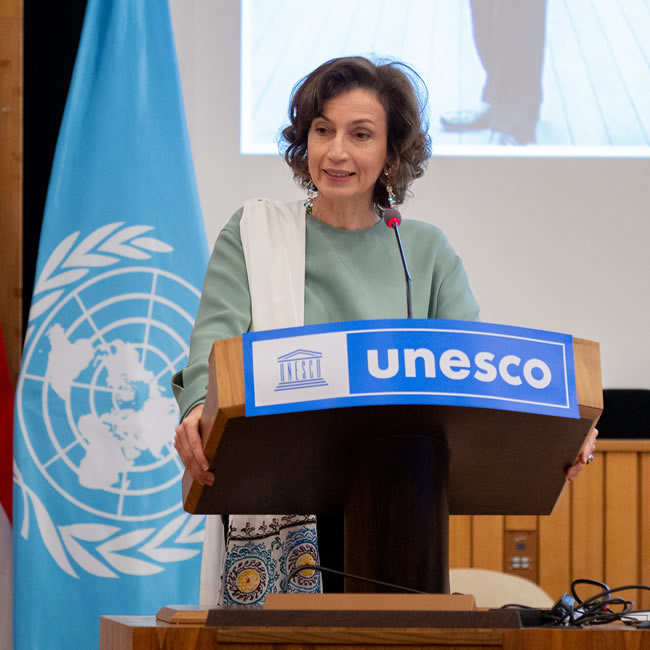« Levi's expands Retail Footprint in Asia, opens Region's Largest Store in Bengaluru, India. | Main | American Association of University Administrators announces its 2023 Annual Awards Recipients. »
April 2, 2023
Artificial Intelligence: UNESCO calls on all Governments to implement Global Ethical Framework without delay

Photo: UNESCO Headquarters Paris. A lecture on “Science at the service of humanity.” December 7, 2022. Image provided by & Copyright © UNESCO/Christelle ALIX. (File Photo)
Paris, France, March 31, 2023 — Following the calls by over 1000 tech workers this week for a pause in training in the most powerful AI systems, including Chat GPT, UNESCO has called on countries to fully implement its Recommendation on the Ethics of Artificial Intelligence immediately. This global normative framework, adopted unanimously by the 193 Member States of the Organization, provides all the necessary safeguards.
“The world needs stricter ethical rules for artificial intelligence: this is the challenge of our time. UNESCO’s Recommendation on the ethics of AI sets the appropriate normative framework. Our Member States all endorsed this Recommendation in November 2021. So it is high time to implement the strategies and regulations at the national level. We have to walk the talk and ensure we deliver on the Recommendation’s objectives,” UNESCO’s Director-General Audrey Azoulay said in a statement.
UNESCO’s Recommendation on the Ethics of Artificial Intelligence is the first global framework for the ethical use of artificial intelligence. It guides countries in maximizing the benefits of AI and reducing the risks it entails. To this end, it contains values and principles and detailed policy recommendations in all relevant areas.
UNESCO is concerned by many of the ethical issues raised by these innovations, in particular discrimination and stereotyping, including the issue of gender inequality, but also the fight against disinformation, the right to privacy, the protection of personal data, and human and environmental rights.
Industry self-regulation is insufficient to avoid these ethical harms. The Recommendation provides the tools to ensure that AI developments abide by the rule of law, avoiding damage and ensuring that when harm is done, accountability and redressal mechanisms are at hand for those affected.
UNESCO’s Recommendation places a Readiness Assessment tool at the core of its guidance to Member States. This tool enables countries to ascertain the competencies and skills required in the workforce to ensure robust regulation of the artificial intelligence sector. It also provides that the States regularly report on their progress and practices in artificial intelligence by submitting a periodic report every four years.
More than 40 countries in all regions of the world are already working with UNESCO to develop AI checks and balances at the national level, building on the Recommendation.
UNESCO has called on all countries to join the movement it is leading to build an ethical AI. UNESCO will present the Progress Report at the UNESCO Global Forum on the Ethics of Artificial Intelligence in Slovenia in December 2023.
Source: UNESCO
|GlobalGiants.Com|







Edited & Posted by the Editor | 1:56 AM | Link to this Post







